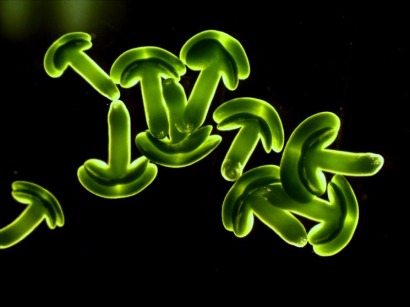
The discovery of the gene controlling ethanol production in a microorganism known as “Clostridium thermocellum” will mean that scientists can now experiment with genetically altering biomass plants to produce more ethanol.
Current methods to make ethanol from a type of biomass found in switchgrass and agricultural waste require the addition of expensive enzymes to break down the plant’s barriers that guard energy-rich sugars. Scientists, including those at BESC, have been working to develop a more streamlined approach in which tailor-made microorganisms produce their own enzymes that unlock the plant’s sugars and ferment them into ethanol in a single step. Identifying this gene is a key step towards making the first tailor-made microorganism that produces more ethanol.
Although scientists have studied Clostridium thermocellum for decades, the genetic basis for its ability to tolerate higher concentrations of ethanol had not been determined. Rather than using just one technique or one approach, the research team that made the discovery was able to draw upon multiple experts spanning several scientific disciplines to contribute a broader set of analyses because of the BESC partnership.
“The Department of Energy relies on the scientific discoveries of its labs and research centres to improve the production of clean energy sources,” said US Energy Secretary, Steven Chu. “This discovery is an important step in developing biomass crops that could increase yield of ethanol, lower production costs and help reduce our reliance on imported oil.”
BESC is led by Oak Ridge National Laboratory and is one of three DOE Bioenergy Research Centers established by the DOE's Office of Science in 2007. The team’s results were published in the Proceedings of the National Academy of Sciences, and their invention is now available for licensing.
Metabolic analysis
In a separate development, researchers at Brookhaven National Laboratory have developed a computational model for analysing the metabolic processes in rapeseed plants. It is hoped that the model will help boost the production of plant oils for the biofuel industry.
Commenting on the two breakthroughs, Keri Fulton from the Energy Department's Office of Public Affairs, said “Both developments sound complicated, but the results are pretty simple: We’re moving in the direction of creating crops that will make it cheaper to produce biofuels, so it’s more competitive with oil”.
For additional information:
Good point. I hadn't thouhgt about it quite that way. :)

